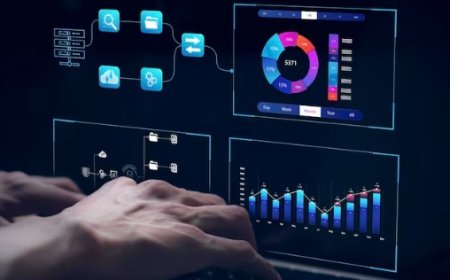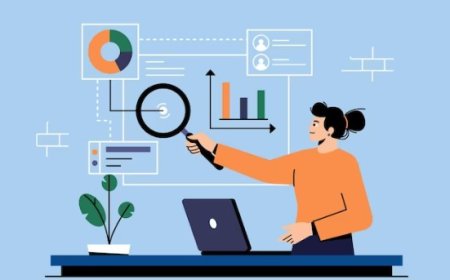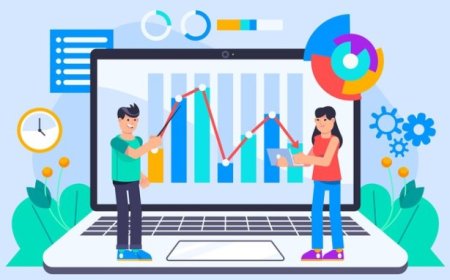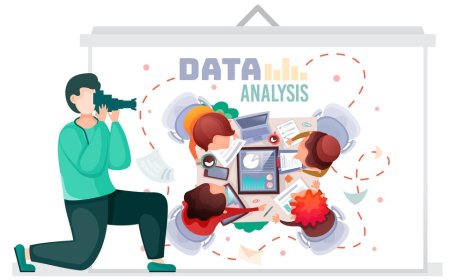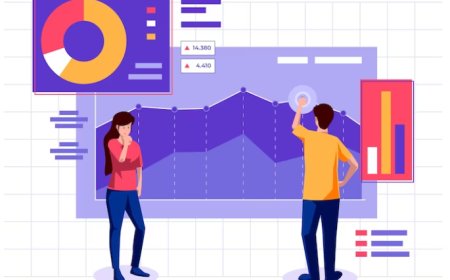Data science is a field that encompasses the use of scientific methods, processes, algorithms, and systems to extract knowledge and insights from structured and unstructured data. At its core, data science involves uncovering findings from data, diving into the what, why, and how of data analysis to inform decision-making processes. It's a discipline that leverages the power of data and analytical techniques to solve complex problems, predict future trends, and enhance understanding in various contexts.
The scope of data science is vast and ever-expanding, touching numerous industries including healthcare, finance, retail, and technology. Data scientists employ a range of techniques to analyze data, from statistical analysis to machine learning, aiming to turn data into actionable insights. This scope also extends to developing algorithms that can process large datasets, data cleaning to improve data quality, and data visualization to communicate findings effectively.
Interdisciplinary Nature of Data Science
Data science sits at the intersection of statistics, computer science, and domain expertise, drawing on principles and techniques from each of these fields to analyze and interpret complex data.
-
Statistics provides the methodology for making inferences from data, including hypothesis testing, estimation, and prediction.
-
Computer Science offers the tools and techniques for managing, processing, and analyzing large datasets, including algorithms, data structures, and database systems.
-
Domain Expertise is crucial for understanding the context of the data, posing relevant questions, and interpreting the results in a meaningful way.
This interdisciplinary approach allows data scientists to tackle problems that are not only technical in nature but also deeply rooted in specific domain contexts, such as economic forecasting, healthcare outcomes, or customer behavior analysis.
Brief History of Data Science and Its Evolution
The term "data science" has evolved over the years, with its roots tracing back to the early use of statistics and data analysis. In the 1960s and 1970s, the initial focus was on data processing and statistics. However, it wasn’t until the late 1990s that the term "data science" began to emerge as a distinct discipline. This period marked the beginning of the digital age, where the explosion of data from the internet and various digital technologies necessitated advanced methods for data analysis.
In 2001, William S. Cleveland introduced data science as an independent discipline, extending the field of statistics to include advances in computing with data. Since then, data science has grown exponentially, fueled by the big data revolution and advancements in computing power and storage. Machine learning and artificial intelligence have become integral to data science, enabling the analysis of data at a scale and speed previously unimaginable.
Today, data science is recognized as a key driver of innovation and strategic decision-making in organizations worldwide. It continues to evolve, embracing new technologies and methodologies to solve increasingly complex data challenges.
The Role of a Data Scientist
At its core, the role of a data scientist is to extract meaningful insights from complex data. It's a position that straddles the realms of IT, statistics, and business, requiring a blend of expertise in each area. Data scientists are tasked with making sense of data, finding patterns, and helping organizations make informed decisions.
What Data Scientists Do
Data scientists analyze large volumes of data to uncover hidden patterns, correlations, and insights. This involves a number of steps, including collecting data from various sources, cleaning it to ensure its accuracy and relevance, and then analyzing it using statistical methods and algorithms. The goal is to turn raw data into actionable intelligence.
Data visualization is another crucial aspect of their work. By creating charts, graphs, and other visual representations of data, they make complex results understandable to those without a technical background. This is essential for communicating findings to stakeholders and guiding strategic decisions.
Beyond analysis, data scientists are also involved in developing predictive models and machine learning algorithms. These models can forecast future trends, behaviors, and outcomes based on historical data, which can be invaluable for planning and optimization across different business functions.
Key Responsibilities and Daily Tasks
-
Data Collection and Cleaning: Before any analysis can begin, data scientists must ensure the data is accurate and relevant. This involves collecting data from various sources, identifying and correcting errors, and preparing the data for analysis.
-
Data Analysis: Using statistical methods and tools, data scientists analyze data to identify trends, patterns, and anomalies.
-
Modeling and Algorithms: They develop predictive models and algorithms to forecast future trends. This involves selecting the right models, training them with data, and fine-tuning them to improve accuracy.
-
Data Visualization and Reporting: Data scientists create visual representations of their findings and prepare reports to communicate insights to non-technical stakeholders.
-
Collaboration: They work closely with other departments, such as marketing, finance, and IT, to understand business needs and objectives. This collaboration helps ensure that the insights generated are aligned with the organization’s goals.
Types of Problems and Projects Data Scientists Work On
Data scientists tackle a wide array of problems, ranging from predictive analytics to machine learning projects. Here are a few examples:
- Customer Behavior Analysis: Analyzing customer data to identify purchasing patterns, preferences, and trends. This can help businesses tailor their products, services, and marketing strategies to better meet customer needs.
- Fraud Detection: Developing models to detect fraudulent activities in financial transactions. By identifying suspicious patterns, companies can prevent financial losses.
- Supply Chain Optimization: Analyzing supply chain data to identify inefficiencies and bottlenecks. This can lead to improved logistics, reduced costs, and better inventory management.
- Sentiment Analysis: Using natural language processing (NLP) techniques to analyze customer feedback, social media comments, and reviews to gauge public sentiment towards a product or brand.
- Healthcare Analytics: Analyzing medical records and other health data to identify trends, improve patient care, and inform public health decisions.
The role of a data scientist is both challenging and rewarding. By turning data into insights, they play a key role in shaping business strategies, improving operations, and driving innovation.
Importance of Data Science
-
Decision Making: Enhances informed decision-making processes by analyzing trends and patterns within large data sets.
-
Predictive Analytics: Utilizes historical data to forecast future events, aiding in proactive planning and strategy development.
-
Efficiency and Optimization: Identifies inefficiencies and optimization opportunities in business operations, leading to improved performance and cost reduction.
-
Innovation and Development: Drives innovation by identifying new opportunities and areas for technological advancements or product development.
-
Customer Insights: Offers a deeper understanding of customer behaviors and preferences, enabling more personalized and effective marketing strategies.
-
Risk Management: Helps in assessing and mitigating risks through predictive models and analysis, contributing to safer and more secure operations.
Essential Skills for a Data Scientist
Data Science, a field that intersects statistical analysis, technology, and business understanding, requires a blend of technical and soft skills. Below are the key competencies essential for a data scientist:
Technical Skills
- Programming Languages: Proficiency in languages like Python and R is foundational. Python offers extensive libraries for data analysis and machine learning (e.g., Pandas, Scikit-learn), while R is renowned for statistical analysis and data visualization.
- Machine Learning: Understanding machine learning algorithms, from linear regression to complex neural networks, enables data scientists to predict outcomes and uncover patterns in data.
- Deep Learning: Familiarity with deep learning frameworks such as TensorFlow or PyTorch is beneficial for tasks involving large data sets and complex computations, like image and speech recognition.
- Data Visualization: The ability to present data through visual representation tools (e.g., Tableau, Matplotlib, Seaborn) helps in making data comprehensible for stakeholders.
- Statistical Analysis: A strong grasp of statistics is crucial for analyzing data sets, testing hypotheses, and making data-driven decisions.
- Data Wrangling: Skills in cleaning and preparing data for analysis are necessary, as real-world data can be messy and inconsistent.
Soft Skills
- Analytical Thinking: The capacity to approach problems systematically and decipher complex data sets is vital for deriving insights.
- Problem-Solving: The ability to formulate solutions to data-related challenges, often requiring innovative approaches and critical thinking.
- Communication: Proficiency in communicating technical information clearly and effectively to non-technical stakeholders is essential for translating data insights into actionable business decisions.
- Collaboration: Data science is often a team effort, requiring the ability to work well with others, including engineers, business analysts, and decision-makers.
The Importance of Continual Learning and Adaptability
- Staying Updated: The field of data science is rapidly evolving, with new tools, techniques, and best practices emerging regularly. Continual learning is crucial for staying relevant.
- Adaptability: Flexibility in adapting to new technologies, methodologies, and business needs is essential for success in data science careers.
- Self-Directed Learning: A proactive approach to learning, through online courses, workshops, and conferences, can enhance one’s skill set and open up new opportunities in the field.
Educational Pathways
Embarking on a career in data science necessitates a foundational understanding of the educational requirements that can pave the way for success in this field. At its core, the journey often begins with a formal education, where pursuing a degree in fields such as computer science, statistics, mathematics, or data science itself is highly beneficial. Such degrees provide a comprehensive foundation in the critical skills and theoretical knowledge necessary for data science roles. Beyond undergraduate studies, advanced degrees like a Master's or Ph.D. can further enhance one's understanding and expertise, particularly for those interested in more specialized areas or research-oriented careers.
However, learning has evolved, and formal degrees are just one part of the educational ecosystem. Certifications have emerged as a practical pathway for professionals to demonstrate proficiency in specific skills or tools essential in data science. Certifications from reputable organizations or platforms in machine learning, data analysis, programming languages (such as Python or R), and big data technologies can significantly bolster a candidate's resume.
Moreover, the rise of self-learning resources has democratized access to data science education. Online courses, tutorials, and platforms offer the flexibility to learn and upskill at one's own pace, catering to both beginners and experienced professionals looking to expand their knowledge base. Resources such as Massive Open Online Courses from leading universities and educational platforms provide comprehensive curriculum on data science topics, ranging from introductory to advanced levels. Engaging in these resources, along with practical experience through personal projects, hackathons, or open-source contributions, can provide hands-on experience that is highly valued in the data science field.
The value of formal education vs. bootcamps and online courses
|
Aspect |
Formal Education |
Bootcamps and Online Courses |
|
Duration |
Typically spans several years (2-4 years for associate and bachelor's degrees, 1-2 years for master's programs). |
Range from a few weeks to several months. |
|
Curriculum Structure |
Broad and comprehensive, covering foundational to advanced topics in a systematic manner. |
Focused and intensive, targeting specific skills or technologies. |
|
Cost |
Generally higher due to longer duration and institutional fees. Financial aid and scholarships may be available. |
Lower in comparison, with some options like MOOCs being free or low-cost. |
|
Learning Environment |
Structured environment with scheduled classes, often includes access to campus facilities. |
Flexible, with options for self-paced learning or scheduled virtual cohorts. |
|
Instruction Method |
Mix of lectures, seminars, and hands-on projects. Face-to-face interaction with professors and peers. |
Primarily online with video lectures, forums, and sometimes live sessions. |
|
Skill Development |
Emphasizes theoretical knowledge, critical thinking, and broad skill sets. |
Focuses on practical, job-ready skills and immediate application. |
|
Networking Opportunities |
Access to university networks, alumni, and career services. Opportunities for research and internships. |
Networking mainly through online communities, mentors, and peers. |
|
Credential |
Degrees (Associate, Bachelor’s, Master’s, PhD) recognized globally. |
Certificates of completion. Some are well-recognized in specific industries. |
|
Career Services |
Often includes comprehensive career counseling, job fairs, and internship placement services. |
Varies widely, with some offering career counseling and job placement assistance. |
|
Accessibility |
Limited by location, admission requirements, and class schedules. |
Highly accessible, requiring only internet access and, in some cases, registration fees. |
|
Best Suited For |
Individuals seeking a comprehensive education, opportunities in academia, or fields requiring a degree. |
Those looking to quickly gain specific skills, career changers, and professionals seeking to update their knowledge. |
Career Opportunities in Data Science
The field of data science offers a broad spectrum of career opportunities across various industries. As businesses and organizations increasingly rely on data-driven decision-making, the demand for skilled data scientists has surged. This section explores the diverse industries that employ data scientists, the roles they may occupy, and highlights some successful data science projects across different sectors.
Industries Employing Data Scientists
Technology: The technology sector, including software companies, internet services, and tech startups, stands at the forefront of employing data scientists. Here, data scientists work on optimizing search algorithms, personalizing content, improving user experiences, and developing innovative products and services.
Healthcare: In healthcare, data scientists analyze patient data, medical records, and research data to improve diagnostics, treatment personalization, and patient care outcomes. They also contribute to public health initiatives by modeling disease spread and analyzing the effectiveness of interventions.
Finance: Financial institutions and fintech companies use data science to detect fraud, manage risk, optimize investment strategies, and enhance customer service through personalized banking experiences.
Retail: Retailers leverage data science to understand customer behavior, optimize inventory levels, personalize marketing efforts, and improve the overall shopping experience through recommendations and targeted promotions.
Roles Related to Data Science
Data Analyst: Data analysts interpret data, analyze results using statistical techniques, and provide ongoing reports. They turn data into information, information into insight, and insight into business decisions.
Machine Learning Engineer: These professionals design and implement machine learning applications and systems. They focus on creating models that can learn and make predictions or decisions without being explicitly programmed to perform the task.
Data Engineer: Data engineers are responsible for the construction and maintenance of the data architecture. They develop, construct, test, and maintain architectures such as databases and large-scale processing systems.
Case Studies Across Different Sectors
Technology - Streaming Service Personalization: A leading streaming service used data science to create a personalized recommendation system. By analyzing viewing habits, ratings, and user preferences, the service can recommend shows and movies with remarkable accuracy, significantly enhancing user satisfaction and engagement.
Healthcare - Predictive Analytics for Patient Care: A hospital implemented a data science project to predict patient admissions and optimize staff allocation. By analyzing historical admission rates, weather data, and local events, the system can forecast admission spikes, allowing the hospital to allocate staff more effectively and improve patient care.
Finance - Fraud Detection System: A financial institution developed a sophisticated fraud detection system using machine learning. The system analyzes transaction patterns in real-time to identify and flag potential fraudulent activities, reducing financial losses and increasing customer trust.
Retail - Inventory Management Optimization: A retail chain used data science to optimize its inventory management. By analyzing sales data, seasonality, and purchasing trends, the company can predict stock levels more accurately, reducing overstock and stockouts, and improving profitability.
Data science offers a wide array of career opportunities across different industries. Each role contributes uniquely to leveraging data for insightful decision-making, improving operations, and driving innovation. As data continues to play a crucial role in shaping industries, the demand for skilled data professionals is expected to grow, opening up more opportunities for those interested in pursuing a career in this dynamic field.
Embarking on a data science journey is both exciting and rewarding. Start by building a solid foundation in mathematics and programming, focusing on languages like Python or R. Dive into machine learning concepts, explore datasets, and work on real-world projects to apply what you've learned. Leverage online courses, bootcamps, and resources to continuously enhance your skills. Engage with the data science community through forums, meetups, and conferences to learn from others and share your experiences. Remember, persistence and curiosity are your best allies as you navigate through the challenges and opportunities in data science. With dedication and continuous learning, you can make significant strides in this dynamic field.

























